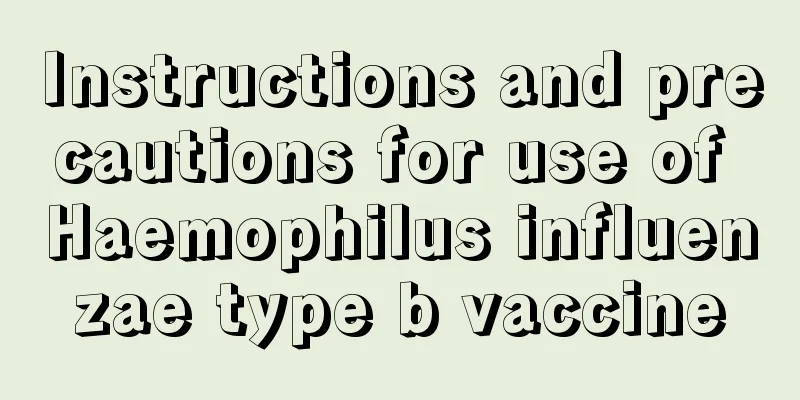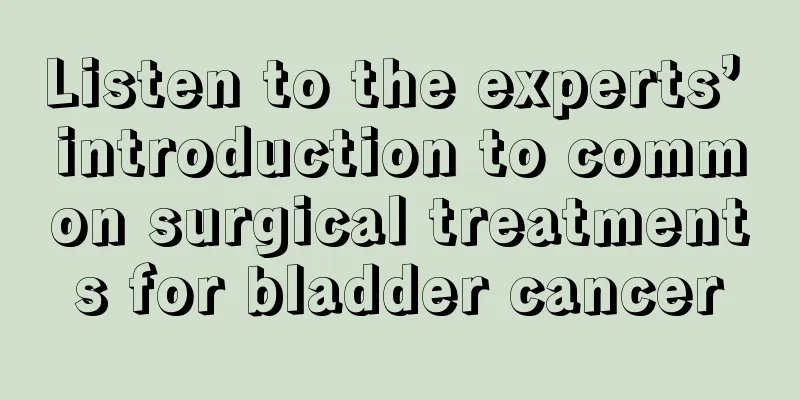Instructions and precautions for use of Haemophilus influenzae type b vaccine

|
When children are young, they need to receive many vaccines, including influenza, polio, hib, etc. There are also many precautions when receiving vaccines, such as it is best not to take a bath on the same day, and not to vaccinate children if they have a cold. Some parents do not understand vaccines and think that vaccination is unnecessary, especially the type B vaccine, which is what we often call HiB. So, what are the precautions for vaccination with Haemophilus influenzae type b vaccine? Let's take a look at the detailed introduction below. What is the Haemophilus influenzae type b vaccine? Before getting any vaccine, we must first understand what the vaccine is, what benefits it will bring to children, and whether it is necessary to get the vaccine. Therefore, before we understand the precautions for getting vaccinated with Haemophilus influenzae type b vaccine, we must first clarify what Haemophilus influenzae type b vaccine is? Otherwise, it would be unsafe to get vaccinated without knowing the answer. Let us now learn about the Haemophilus influenzae type b vaccine. Haemophilus influenzae type b is abbreviated as Hib. Hib is a pathogen that causes serious illness or even death in infants and young children. Around the world, Hib is a major cause of childhood illness; Hib is the main pathogen causing serious infections in infants and young children under 5 years old; in developing countries, Hib invasive disease is the main cause of death in infants and young children, mainly causing pneumonia, with a poor prognosis. Among cases of purulent meningitis in children under 5 years old, Hib infectious meningitis accounts for about 60%. In developing countries, the mortality rate of meningitis caused by Hib can reach 20%-50%. Other common infections induced by Hib include childhood sepsis, epiglottitis, otitis media, arthritis, pericarditis, etc. Hib is mainly transmitted through air droplets or contact with secretions of infected patients. Hib infection usually starts in the nose and throat, then spreads to other parts and causes disease. These parts include: skin, bones, blood, spine and brain, lungs, heart, and joints. Diseases caused by Hib primarily strike children younger than 5 years of age, with a peak incidence between 6 and 11 months of age; an estimated 17% of diseases caused by Hib occur in children younger than 6 months of age. In my country, due to reasons such as diagnostic technology, Hib infection is still not recognized by most people, and there is no complete data on its incidence. Although Hib infection can be treated with antibiotics, due to the difficulty in clinical diagnosis and the increase in drug-resistant strains, vaccination is the most economical and effective means of prevention. WHO recommends that all countries should include Hib vaccine in their national immunization programs. Hib vaccine can effectively prevent the above diseases caused by Hib bacteria. The United States and other countries have long listed this vaccine as a routine immunization for children. Precautions for vaccination against Haemophilus influenzae type b
1. Immunosuppressive therapy or immunodeficiency can reduce the immune response to vaccines. 2. Shake well before use. Do not use if there is agglomerate that cannot be shaken apart, foreign matter, cracks in the bottle, the product has been frozen, the label is unclear, or it is expired. 3. This vaccine can be administered simultaneously with measles-rubella-mumps vaccine, diphtheria-pertussis-tetanus vaccine, and polio vaccine, but the vaccines should be injected at two different sites. Dosage and method of Haemophilus influenzae type b vaccine
1. Intramuscular injection is given at the upper 1/4 of the buttocks or at the attachment of the deltoid muscle on the outer side of the upper arm after disinfection. 2. Starting from 3 months of age, vaccinate once every 1 or 2 months (0.5ml), for a total of three times. A booster vaccination is given at 18 months. 3. For children aged 6-12 months, inject once every 1 or 2 months (0.5ml), for a total of two times. A booster vaccination is given at 18 months. 4. Children aged 1-5 years only need one injection (0.5mI) Contraindications of Haemophilus influenzae type b vaccine
1. This product is only for vaccination of infants and young children and is prohibited for use by pregnant women. 2. The drug should be temporarily suspended when the child has fever, acute illness, especially infectious disease or active chronic disease. 3. Injection cannot be performed through blood vessels. Make sure the injection needle is not in the blood vessels. 4. People who are known to have allergic reactions to any of the vaccine ingredients, especially those who are allergic to tetanus toxoid, or those with severe heart disease, hypertension, liver or kidney disease are contraindicated. Haemophilus influenzae type b vaccine adverse reactions
1. In clinical controlled studies, actively monitor and record daily the symptoms and signs that occur after vaccination. 2. Extremely rare allergic reactions, including anaphylaxis, have been reported. 3. Within 48 hours after vaccination, common local symptoms collected include mild redness at the injection site, which can resolve on its own. Other local symptoms reported included mild swelling and pain at the injection site. 4. Within 48 hours after vaccination, the collected and reported systemic symptoms are mild and can be relieved on their own. These symptoms include fever, loss of appetite, irritability, vomiting, diarrhea and unusual crying. As with all Haemophilus influenzae type b vaccines, there have been reports of the above-mentioned systemic symptoms occurring when this product is administered simultaneously with other vaccines. It can be seen that the precautions for vaccination with Haemophilus influenzae type b vaccine are very important. Parents must understand them in detail and get vaccinated under the guidance of professional knowledge. Never go to a small clinic for vaccination casually. There are generally designated hospitals to vaccinate children. Parents must follow the regulations on time. |
<<: The important role of zinc supplementation, expectant mothers should pay attention to it
Recommend
Will urine turn yellow in early pregnancy?
Once a woman becomes pregnant, it means she is st...
The transport form of ammonia in the blood
I believe that everyone who has studied chemistry...
What is the best way to treat red prickly heat?
Everyone knows that people are more likely to get...
The efficacy and function of Fupian
I don’t know if you have ever used aconite in you...
What is the escape method for hotel fire
For friends who often go out, you should know how...
I have itchy bumps on my arms, what's going on?
There are small bumps on your arms and they are v...
Can I eat eggs if I have a gastrointestinal cold
When the seasons change, the flu is at its worst....
Why does chest pain occur due to poor rest?
People nowadays face tremendous pressure from wor...
Does heart valve replacement require open-chest surgery?
For the surgery to replace the heart valve, it is...
How big are women's ovaries?
Women must pay attention to the maintenance of th...
Why does hot compress on the belly make it look weird
Hot compress is a common way for people to deal w...
What should I do if I have a thick bump on my butt
What's the matter with the thick lump on the ...
How to store broccoli
Broccoli is a vegetable we often eat. It has a go...
What are the symptoms of tongue tumor
Tongue cancer is the most common type of oral can...
What are the early symptoms of lung cancer bone metastasis? 3 early symptoms of lung cancer bone metastasis you should know
Bones are a common site for lung cancer metastasi...









